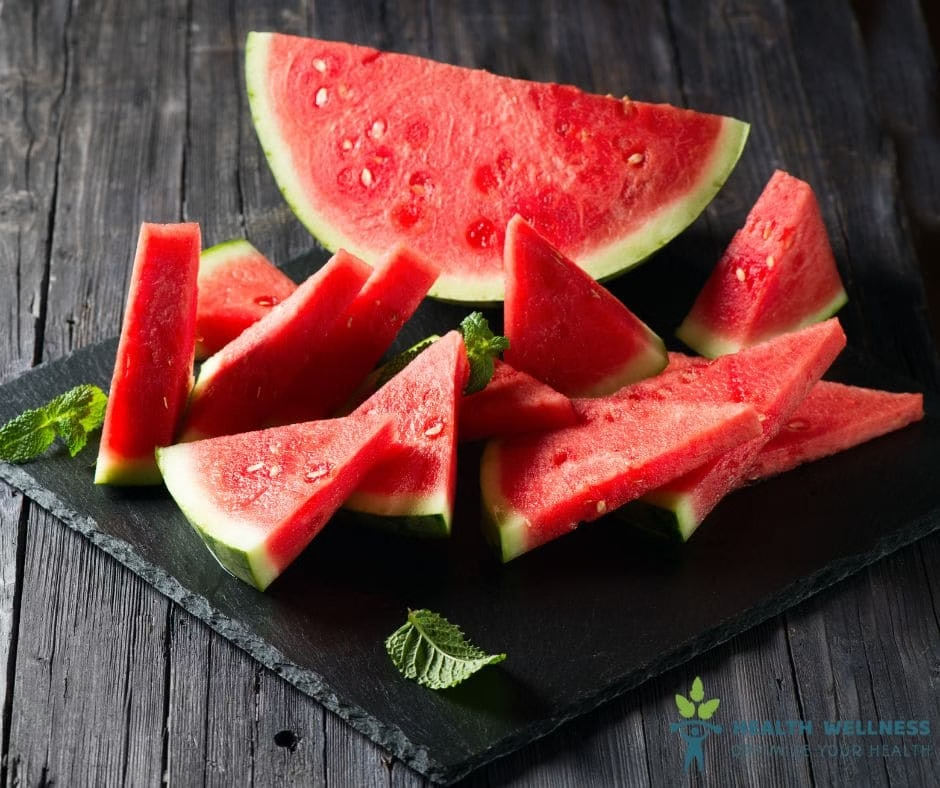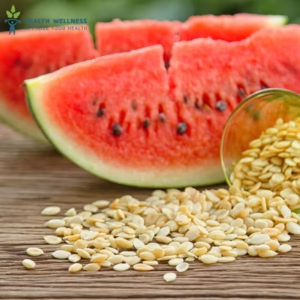Benefits of Watermelon
many of us don’t know that watermelon has more lycopene. The content of lycopene present in watermelon is more compared to any other fruits and vegetables, like tomatoes.
This refreshing fruit contains more than 90% water but delivers strong nutrition with just 46 calories per cup. On top of that, it offers health benefits way beyond simple hydration. After many research Studies made on watermelon shown that it can lower the blood pressure.
Let’s look at this summer favorite’s hidden powers as we learn about everything from watermelon juice’s benefits to its seeds’ overlooked value. 
The Surprising Compounds in Watermelon Your Doctor Rarely Mentions
Watermelon tastes refreshing, but its chemical makeup contains remarkable health-promoting compounds that doctors rarely mention during checkups.
Citrulline: The amino acid that lowers blood pressure
Japanese researchers first isolated citrulline from watermelon in 1914. This non-essential amino acid offers powerful benefits for your heart. The watermelon’s rind contains higher concentrations of citrulline (61.4 mg/100g fresh weight) than its flesh (39.7 mg/100g).
Your body converts citrulline to arginine, which produces nitric oxide—a compound that relaxes and dilates blood vessels. This explains why taking watermelon reduces systolic blood pressure by 10.55 mmHg and diastolic blood pressure by 5.22 mmHg.
People with prehypertension who take citrulline supplements see their aortic systolic blood pressure drop by 7 mmHg and brachial pulse pressure by 8 mmHg. These benefits show up mainly in people who already have high blood pressure rather than those with normal readings.
Lycopene: More than just a red pigment
Watermelon packs 40% more lycopene than tomatoes (4.81 mg/100g versus 3.03 mg/100g). Your body can absorb watermelon’s lycopene right away, unlike tomato lycopene that needs processing to work best.
This antioxidant’s numerous double bonds make it better at fighting free radicals than alpha-tocopherol (vitamin E). Research shows lycopene helps restore vital antioxidant enzymes like glutathione peroxidase and superoxide dismutase while reducing harmful malondialdehyde levels in patients with high blood pressure.
Studies on lycopene’s cancer-fighting abilities show mixed results. Yet, people who eat lycopene-rich foods might have lower risks of breast, prostate, and lung cancers.
Cucurbitacin E: The cancer-fighting compound
Cucurbitacin E might be the least known but most fascinating compound in watermelon. This bitter-tasting, highly oxidized tetracyclic triterpenoid shows remarkable potential to fight cancer. It stops cells from multiplying during the S to M phase of cell division.
Lab tests prove cucurbitacin E fights several cancer cell lines, including colon (HCT-116), lung (NCI-H460), breast (MCF-7, ZR-75-1), prostate (PC-3), and liver (HepG2). It works by disrupting cytoskeleton structures of actin and vimentin while blocking STAT3 signaling pathways that cancer needs to grow.
Cucurbitacin E also shows promise in reducing new blood vessel growth that feeds tumors and protects liver cells from toxic damage.
Watermelon Juice Benefits Beyond Simple Hydration
Watermelon juice does more than just quench your thirst. Science proves it has exceptional benefits. A glass of watermelon juice contains 92% water, making it better at hydrating you than many store-bought drinks.
How watermelon juice improves exercise recovery

L-citrulline, an amino acid in watermelon juice, helps your muscles recover faster and reduces soreness. Research shows athletes who drank watermelon juice before intense workouts had lower heart rates. Their muscle soreness dropped substantially 24 hours after exercise.
Fresh watermelon gives you 286 to 1,266 milligrams of L-citrulline. Your body turns this into L-arginine, which boosts nitric oxide production and improves blood flow to tired muscles. Your body absorbs L-citrulline better from fresh, unpasteurized watermelon juice than from supplements.
The sleep-enhancing properties of fresh watermelon juice
Watermelon juice might help you sleep better, though researchers haven’t studied this as much as its exercise benefits. Good hydration from the high water content helps you sleep well. The natural sugars (18.9g per glass) help keep your blood sugar steady through the night.
Potassium and magnesium in watermelon juice help you relax your muscles and support your nervous system. These minerals work together to regulate your sleep patterns and make you more comfortable at night.
Why watermelon juice may be better than sports drinks

Sports drinks often have artificial ingredients, but watermelon juice gives you natural benefits:
- Each glass has about 22 grams of simple carbs that refill your energy stores within the vital 90-120 minute window after workouts
- Natural electrolytes like potassium and magnesium come packed inside
- You get L-citrulline, something regular sports drinks don’t have
- Your body gets more antioxidants compared to drinks with just carbs
Mix watermelon juice with foods rich in protein, fat, and fiber to keep your blood sugar balanced. This natural drink supports your workout needs and gives you nutrition that synthetic sports drinks just can’t match.
Watermelon Seeds Benefits: Don’t Throw Them Away
Take a moment the next time you bite into a juicy watermelon slice. Those black seeds you’ve been spitting out or avoiding are a rich source of nutrients that could boost your health by a lot.
Nutritional profile of watermelon seeds

These small black specks pack quite a punch. One ounce (28g) of dried watermelon seed kernels has about 158 calories and 8 grams of protein. That’s more protein per serving than you’ll find in peanuts or almonds.
These seeds are loaded with essential minerals. A single ounce gives you:
- 146 mg of magnesium (37% of daily needs)
- 2.06 mg of iron
- 2.9 mg of zinc
- 214 mg of phosphorus
The seed’s fat content stands out. You’ll get heart-healthy monounsaturated (2.1g) and polyunsaturated fatty acids (7.96g) in each ounce. We found these mostly as linoleic acid. These good fats help reduce bad cholesterol in your blood.
Raw watermelon seeds might not taste great at first. But roasting them creates a tasty snack that tastes like sunflower seeds with a milder nutty flavor. You could also sprout them to boost their nutritional value even more.
How watermelon seeds support digestive health

These seeds work as your digestive friends thanks to their fiber content. Each ounce packs 4 grams of fiber that helps keep your digestion regular and healthy.
The seeds’ whole form contains mostly insoluble fiber. Nature designed them to pass safely through your digestive system. You should cook or sprout the seeds to get the most nutrients and digestive benefits.
All the same, don’t go overboard. Too many seeds might upset sensitive stomachs. Your body needs time to adjust to the extra fiber.
Start adding these seeds to your diet slowly. Try sprinkling roasted seeds on yogurt, salads, or blend them in smoothies. You could also brew watermelon seed tea to help with fluid retention and blood pressure.
Unexpected Ways Watermelon Supports Mental Health
Watermelon does more than just taste good. This refreshing fruit can boost your mental health in ways you might not expect. The compounds in watermelon can affect your brain function and mood naturally.
The connection between watermelon and stress reduction
Your body needs vitamin B6 to make brain chemicals that help you feel less stressed and anxious. Watermelon has plenty of it. Eating watermelon regularly helps your nervous system stay balanced when times get tough.
Magnesium in watermelon helps your muscles relax and makes you feel calmer. This vital mineral also helps control stress hormones in your body. It works to curb the negative effects that long-term stress has on your mental health.
How watermelon’s nutrients affect mood and anxiety
Studies show that people with anxiety and depression have lower levels of vitamins A, C, and E compared to others. Patients who took these vitamins – all found in watermelon – saw their anxiety and depression levels drop by a lot after six weeks.
Watermelon has polyphenols that help good bacteria grow in your gut. Your gut health matters because scientists have found strong links between anxiety and digestive problems. Yes, it is true that when your gut feels better, anxiety often improves too.
The bright red color in watermelon comes from lycopene, which can ease depression by helping brain cells communicate better. This improves your brain’s ability to form new connections that you need to learn, remember things, and stay emotionally stable.
Watermelon’s role in cognitive function
Experts call watermelon a “virtual warehouse of benefits for the brain”. The vitamin B6 it contains makes your brain work better.
L-citrulline in watermelon helps make nitric oxide, which opens up blood vessels and improves blood flow. Better circulation means your brain gets more oxygen and nutrients. This helps you think clearly and perform better mentally.
Scientists have found that watermelon contains antioxidants like lycopene and beta carotene that may protect against cognitive decline. These compounds shield your brain cells from damage and help keep your mind sharp as you age.
Conclusion
Watermelon is nature’s versatile superfood that does much more than just refresh you. Research shows this amazing fruit can significantly affect both physical and mental health. The fruit contains powerful compounds like citrulline, lycopene, and cucurbitacin E, and each one plays a unique role in maintaining our health.
Science has proven that watermelon works as a natural performance booster. Many people throw away watermelon’s seeds and juice, but these parts are packed with nutrients. The seeds give you essential minerals and healthy fats, while the juice helps you recover from exercise better than typical sports drinks.
The fruit’s effects on mental health and brain function are truly remarkable. Its rich vitamin content and special compounds help reduce stress levels, lift your mood, and keep your brain healthy. The antioxidants in watermelon protect your cognitive function and make your mind sharper.
Watermelon isn’t just a summer treat – it’s a nutritional powerhouse you can enjoy all year. Athletes who want better recovery, people watching their blood pressure, or anyone looking to boost their health should make watermelon a regular part of their diet.

